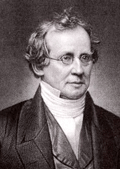the Fourth Week of Lent
Click here to learn more!
Bible Commentaries
Hodge's Commentary on Romans, Ephesians and First Corintians Hodge's Commentary
New Testament
Theological reflections on Jesus as the Word of God, focusing on his divine nature and mission. Romans
A theological treatise on salvation, grace, faith, and righteousness through Jesus Christ for all. 1 Corinthians
Paul addresses divisions, immorality, and spiritual gifts in the Corinthian church. Ephesians
Paul's teachings on the church's unity, spiritual blessings in Christ, and Christian conduct.
Author's Biography
Charles Hodge (1797-1878) stands as a towering figure in American theological history, renowned for his deep commitment to Reformed theology and his influential role at Princeton Theological Seminary. Born on December 27, 1797, in Philadelphia, Hodge was destined for a life steeped in religious study and teaching, reflecting his profound dedication to the Presbyterian faith.
Hodge's educational journey began at the University of Pennsylvania, but it was at Princeton Theological Seminary where he found his true calling. After completing his studies, he joined the Princeton faculty in 1822, marking the beginning of a remarkable six-decade tenure. Hodge's teaching and writings would go on to shape the contours of American Presbyterianism and establish him as a leading voice in conservative theology.
As a theologian, Hodge was a staunch defender of Calvinist orthodoxy, advocating for the authority of the Bible and the doctrines of grace. His theological contributions were vast, encompassing a rigorous defense of biblical inerrancy and a meticulous critique of emerging liberal theological trends. His seminal works, including a three-volume "Systematic Theology," remain influential in Reformed circles, offering a comprehensive exposition of Calvinist doctrine that continues to be studied and revered.
Beyond his scholarly achievements, Hodge was deeply involved in the life of the Presbyterian Church, participating in its highest councils and contributing to its theological debates. His legacy is not only that of a theologian and educator but also as a pastor-at-heart, deeply concerned with the spiritual well-being of his students and the broader church community.
Charles Hodge's death on June 19, 1878, marked the end of an era for Princeton Seminary and American Presbyterianism. Yet, his theological vision and academic legacy endure, cementing his status as a foundational figure in the shaping of American evangelical thought. Through his writings and the generations of students he taught, Hodge's influence continues to resonate, embodying a steadfast commitment to faith, scholarship, and the transformative power of the Gospel.
